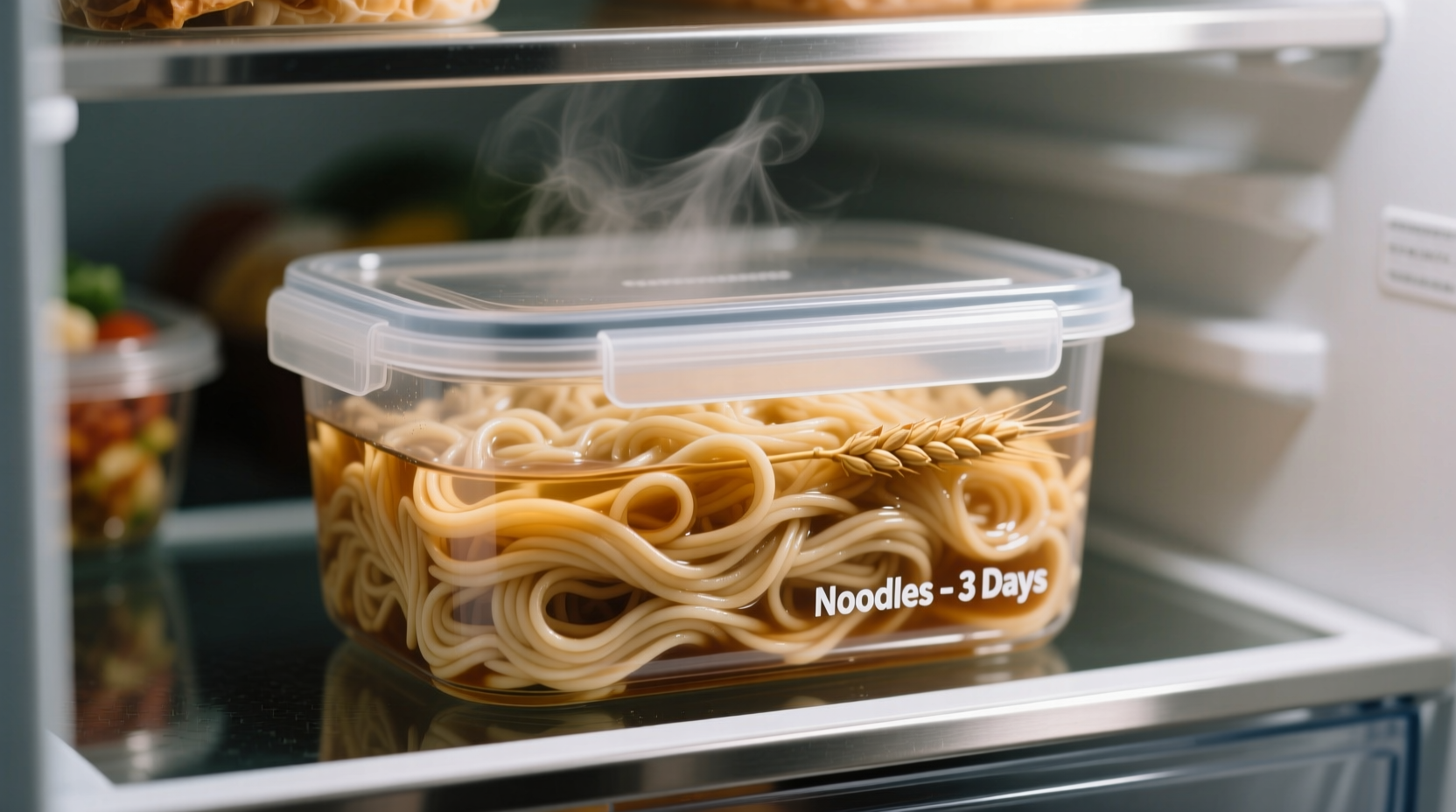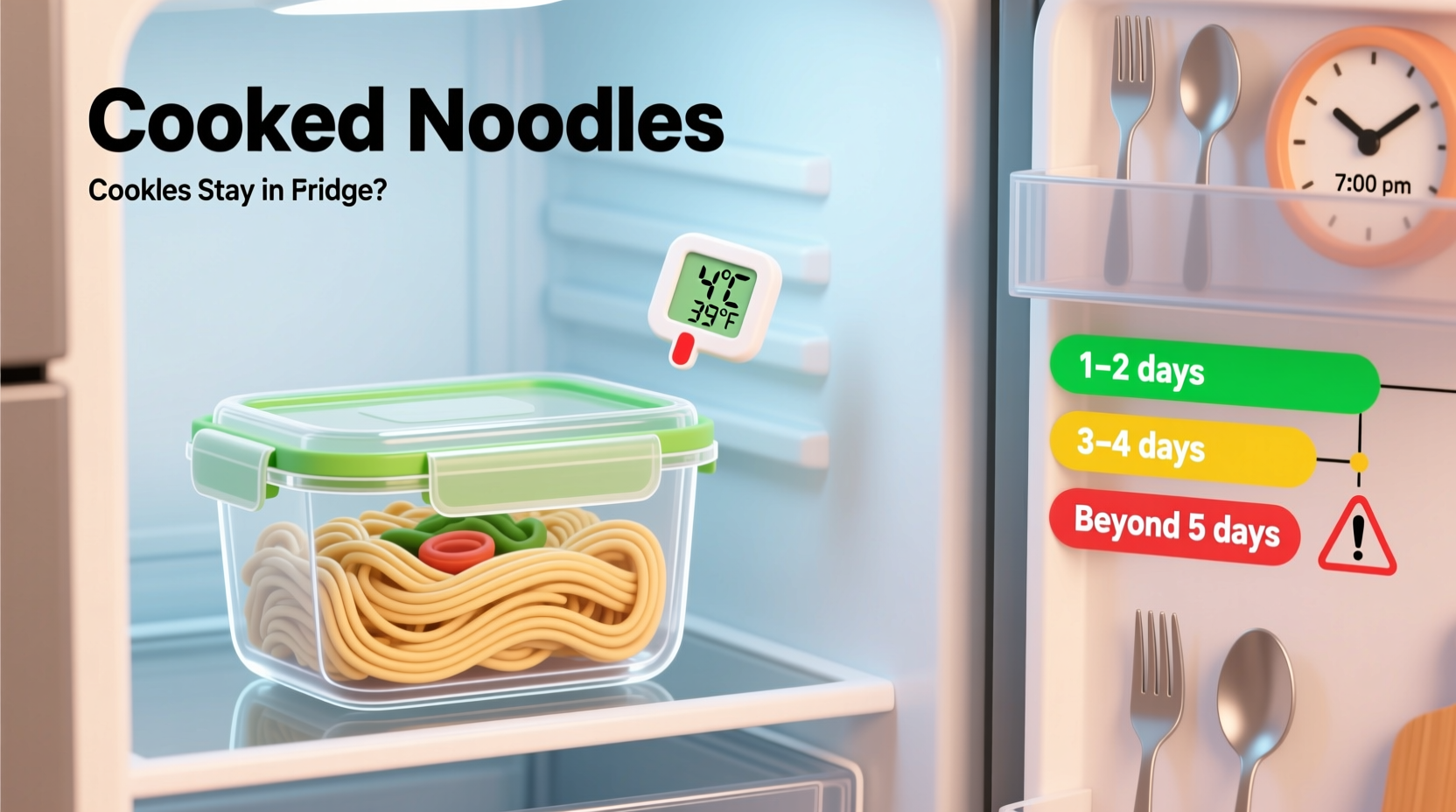Direct Answer: Cooked noodles can safely stay in the refrigerator for 3-5 days when stored properly at 40°F (4°C) or below in an airtight container. After this timeframe, the risk of foodborne illness increases significantly due to potential bacterial growth.
When you've cooked a big batch of noodles or have leftovers from your favorite Asian dish, knowing exactly how long cooked noodles stay fresh in the refrigerator is crucial for both food safety and quality. Getting this wrong could lead to wasted food or, worse, food poisoning. As someone who's worked with noodles across multiple cuisines throughout my career, I've seen how proper storage makes all the difference between enjoying delicious leftovers and dealing with spoiled food.
Your Complete Guide to Noodle Storage Safety
Understanding how long can cooked noodles stay in the fridge isn't just about following a number—it's about recognizing the factors that affect freshness and safety. Let's break down exactly what you need to know to keep your noodles safe and delicious.
Why the 3-5 Day Rule Matters for Food Safety
The USDA Food Safety and Inspection Service clearly states that cooked pasta and noodles should be consumed within 3-5 days when refrigerated properly. This guideline isn't arbitrary—it's based on extensive research into bacterial growth patterns in cooked starches. When noodles cool to temperatures between 40°F and 140°F (the "danger zone"), bacteria like Salmonella and Bacillus cereus can multiply rapidly.
| Storage Timeline | Noodle Condition | Safety Status |
|---|---|---|
| 0-24 hours | Fresh texture, normal appearance | Optimal safety and quality |
| 2-3 days | Slightly softer texture, may appear drier | Safe to eat if stored properly |
| 4-5 days | Noticeably softer, possible moisture separation | Last safe window for consumption |
| 6+ days | Sour smell, slimy texture, visible mold | Unsafe - discard immediately |
Factors That Affect How Long Noodles Last
Not all noodle situations are equal. Several critical factors determine exactly how long cooked noodles stay good in the refrigerator:
Noodle Composition Matters
Egg noodles typically have a shorter shelf life (3-4 days) compared to regular pasta (4-5 days) because the eggs provide additional nutrients for bacteria. Asian rice noodles generally follow the same timeline as wheat-based noodles, but their higher moisture content can sometimes accelerate spoilage.
Sauce and Mix-Ins Change the Equation
Noodles stored with sauce last differently than plain noodles. Tomato-based sauces tend to preserve noodles slightly longer due to their acidity, while dairy-based sauces (like alfredo) reduce the safe storage window to 3-4 days. Protein additions like chicken or shrimp should be treated as the limiting factor—you'll need to follow the shorter shelf life of the protein component.
Proper Cooling is Non-Negotiable
One of the most common mistakes people make is putting hot noodles directly into the refrigerator. This raises the internal temperature of your fridge and creates condensation that accelerates spoilage. Always cool noodles to room temperature within 2 hours of cooking before refrigerating—this critical step affects how long cooked noodles remain safe to eat in the fridge.

Maximizing Noodle Freshness: Storage Best Practices
Following these professional storage techniques will help you get the maximum safe shelf life from your cooked noodles:
Container Selection is Key
Always use airtight containers rather than leaving noodles in cooking pots or loosely covered dishes. Glass containers with locking lids work best as they prevent odor transfer and maintain consistent temperature. If using plastic containers, choose BPA-free options specifically designed for food storage.
The Oil Trick for Longer Freshness
Before storing plain noodles, toss them with 1-2 teaspoons of neutral oil (like canola or vegetable oil). This creates a protective barrier that prevents sticking and slows moisture loss. Don't overdo it—too much oil will make your noodles greasy when reheated.
Portion Control for Safety
Store noodles in single-serving portions rather than one large container. Each time you open the container, you expose the entire batch to air and potential contaminants. Smaller portions mean less frequent opening and a better chance of maintaining the full 5-day shelf life.
Recognizing When Noodles Have Gone Bad
Knowing how long cooked noodles last in the refrigerator is important, but equally critical is recognizing when they've spoiled. Don't rely solely on the calendar—always check for these warning signs:
- Sour or unpleasant odor - Fresh noodles shouldn't have a strong smell
- Slippery or slimy texture - A clear sign of bacterial growth
- Visible mold spots - Any mold means immediate discarding
- Unusual discoloration - Particularly yellow or gray hues
- Bubbles or foam - Indicates active fermentation
When in doubt, throw it out. Foodborne illness from improperly stored noodles isn't worth the risk.
Creative Ways to Use Leftover Noodles Before They Spoil
Make the most of your noodles before they reach their storage limit with these chef-recommended ideas:
Noodle Frittata
Mix 2 cups of leftover noodles with 4 beaten eggs, some sautéed vegetables, and cheese for a quick breakfast frittata. The egg mixture helps mask any slight texture changes in older noodles.
Cold Noodle Salad
Toss noodles with a light vinegar-based dressing, fresh herbs, and crisp vegetables for a refreshing salad. The acidity helps extend freshness for an additional day.
Stir-Fry Revival
High-heat stir-frying can restore texture to noodles that are approaching day 4. The quick cooking process revitalizes them while killing surface bacteria.
When Freezing Makes Sense for Longer Storage
If you won't use your noodles within 5 days, freezing is your best option. Cooked noodles freeze well for 1-2 months when stored properly:
- Cool noodles completely
- Toss with small amount of oil
- Portion into freezer bags, removing as much air as possible
- Label with contents and date
- Freeze flat for easy stacking
When ready to use, thaw overnight in the refrigerator or drop frozen noodles directly into boiling water for 30-60 seconds.
Common Questions About Noodle Storage
Can I eat cooked noodles after 7 days in the refrigerator?
No, cooked noodles should not be eaten after 7 days in the refrigerator. The maximum safe storage time is 5 days when kept at 40°F or below. After this point, even if they appear normal, harmful bacteria may have reached dangerous levels that can cause foodborne illness.
Do different types of noodles have different fridge lifespans?
Yes, different noodle types have slightly varying shelf lives. Egg noodles typically last 3-4 days, while regular wheat pasta lasts 4-5 days. Rice noodles follow similar timelines but may spoil slightly faster due to higher moisture content. Noodles with sauce follow the shortest shelf life of any component—dairy-based sauces reduce the window to 3-4 days.
What's the best way to reheat refrigerated noodles?
The best method is to briefly dip noodles in boiling water for 30-60 seconds, then drain. Alternatively, microwave with a tablespoon of water, covered, for 60-90 seconds, stirring once. Avoid prolonged reheating which can make noodles mushy. Always check that reheated noodles reach 165°F internally for food safety.
Why do my refrigerated noodles get hard?
Noodles become hard in the refrigerator due to starch retrogradation - a process where starch molecules recrystallize as they cool. This is normal and reversible through proper reheating. Tossing noodles with a small amount of oil before storage can minimize this effect. Don't confuse this normal hardening with spoilage, which presents as sliminess or sour odors.











 浙公网安备
33010002000092号
浙公网安备
33010002000092号 浙B2-20120091-4
浙B2-20120091-4